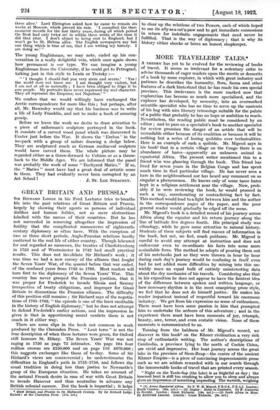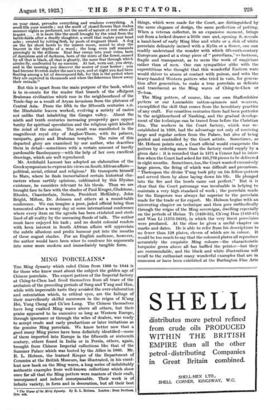MORE TRAVELLERS' TALES.*
A THEORY has yet to be evolved for the reviewing of books of travel. It seems so irrelevant for a sedentary critic to advise thousands of eager readers upon the merits or demerits of a book by some explorer, in which with great industry and patience he describes the humanity, flora, fauna and other features of a dark hinterland that he has made his own special province. This irrelevance is the more marked now that exploration has become so much more specialized, and the explorer has developed, by necessity, into an overworked scientific specialist who has no time to serve up the contents of his bag with nice literary trimmings suitable for the palate of a public that probably he has no hope or ambition to reach. Nevertheless, the reading public must be considered by an editor ; and to pass on a specialist's book to another specialist for review promises the danger of an article that will be unreadable either because of its erudition or because it will be nothing but a series of boring quibbles over technicalities. Here is an example of such a quibble. Mr. Migeod says in his bookl that in a certain village on the Congo there is an abundance of hares—apparently an unknown animal in equatorial Africa. The present writer mentioned this to a friend who was glancing through the book. This friend has lived for seven years in the Belgian Congo and has spent much time in that particular village. He has never seen a hare in the neighbourhood nor has heard any comment on so singular a phenomenon. He knows only of some tame hares kept in a religious settlement near the village. Now, probably if lie were reviewing the book, he would proceed in such a way, corroborating or contradicting fact by fact. This method would lead to a fight between him and the author in the correspondence pages of the paper, and the poor general reader would gradually be edged off the scene.
Mr. Migeod's book is a detailed record of his journey across Africa along the equator and his return journey along the line of latitude five degrees South. His principal study was ethnology, while he gave sonic attention to natural history. Students of these subjects will find masses of information in the book, but not, we feel, much guidance. Mr. Migeod is careful to avoid any attempt at instruction and does not endeavour even to co-ordinate his facts into some more assimilable form. The method he adopts of pouring them out of his notebooks just as they were thrown in hour by hour during each day's journey would be confusing in itself even had he not added more difficulties by mixing into this unwieldy mass an equal bulk of entirely uninteresting data about the dry mechanics of his travels. Considering also that in his exposition he does not appear to have the faintest idea of the difference between spoken and written language, or how necessary rhythm is in the most unaspiring prose style, we feel that he does not do himself justice; He makes his reader impatient instead of respectful toward his enormous industry. We get from his expression no sense of enthusiasm. There must have been some passion in him that prompted him to undertake the ardours of this adventure ; and in the experience there must have been moments of joy, triumph, beauty, awe, terror, and even ecstatic vision. None of these moments is communicated to us.
Turning from the baldness of Mr. Migeod's record, we discover in this books on the Khmer civilization a very rich crop of enthusiastic writing. The author's descriptions of Cambodia, a province lying to the north of Cochin China, are vivid and impressive. Her boat journey across the great lake in the province of Siem-Reap--the centre 'of the ancient Khmer Empire—is a piece of convincing impressionistic prose such as we are seldom rewarded with in our search through the innumerable books of travel that are printed every season.
" Night on the Tonle-Sap (the lake) is as frightful as day ; the lessened heat is still too crushing to allow you to sleep and always gives an impression of something impending. The warmth, weighing on your chest, pervades everything and weakens everything. A smell fills your nostrils ; not the smell of closed flowers that makes summer nights so perfumed, not the smell of nature at rest when all is quiet . . . it is more like the smell brought by the wind from the battle-fields after a deadly slaughter, a smell that makes your head ache ; created by rotting flesh, by pools of stagnant blood. A dog on the far shore howls to the unseen moon, sound to stop the bravest in the' depths of a wood ; the long, even yell resounds piercingly in the stillness. Real fear creeps into your veins, born of dampness and of darkness, born of the mists of the forest, caused by all that is black, all that is ghastly, the same fear through which armies fly, confronted by no enemies. At last, worn out, you sleep, and in the morning you discover the source of your horror : you had become feverish under the sun's rays, and at night you had been floating among a lot of decomposed fish, for this is the period when they are captured in thousands and when the fishermen throw away their entrails."
But this is apart from the main purpose of the book, which is to re-create for the reader that branch of the effulgent Brahman civilization which rose in the neighbourhood of the Tonle-Sap as a result of Aryan invasions from the plateaus of Central Asia. From the fifth to the fifteenth centuries A.D.
the Hinduistic leaven worked, evolving a society of castes not unlike that inhabiting the Ganges valley. About the ninth and tenth centuries increasing prosperity gave opportunity for spiritual speculation and the religious spirit kindled the mind of the nation. The result was manifested in the magnificent royal city of Angkor-Thom, with its palaces, ramparts, gates and Brahman temples. The ruins of this departed glory are examined by our author, who describes them in detail—sometimes with a certain amount of hardly pardonable flamboyancy—with the help of her own excellent drawings, which are well reproduced.
Mr. Archibald Lamont has adopted an elaboration of the Greek symposium to express his views on South African affairs— political, social, ethical and religious .3 He transports himself to Mars, where he finds immortalized certain historical characters whose earthly opinions, sublimated by this Elysian
existence, he considers relevant to his thesis. Thus we are brought face to face with the shades of Paul Kruger, Gladstone, Rhodes, Chamberlain, Nelson, President McKinley, John Bright, Milton, Dr. Johnson and others at a round-table conference. We can imagine a poor, jaded official being thus
tormented after a weary day at some international conference where every item on the agenda has been etiolated and steri
lized of all reality by the unceasing floods of talk. The author must have enjoyed his task ; and no doubt colonial readers with keen interest in South African affairs will appreciate the subtle allusions and prolix humour put into the mouths of these august shades. For an English audience, however, the author would have been wiser to condense his arguments into some more modern and immediately tangible form.



































 Previous page
Previous page